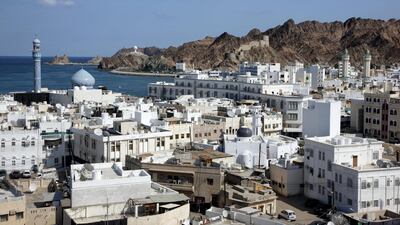Oman is expected to generate 300 million Omani rials ($779m) in revenue through value-added tax this year, according to the country’s finance minister.
The financial impact of the measures taken as part of the 2021 budget plan will reach about 3.5 billion rials, Oman News Agency reported, citing Sultan bin Salem Al Habsi. This includes VAT revenue as well as “improving returns from government investments and broadening excise taxes and improving tax collection”, the minister said.
The Gulf state will start levying 5 per cent VAT on most goods and services in April, with some exemptions.
The move comes as Oman seeks to boost revenue, which has been hit by low oil prices and the coronavirus pandemic.
All six GCC states agreed to introduce 5 per cent VAT in 2018 after a slump in oil prices hit their revenues. The UAE, Saudi Arabia and Bahrain have already introduced the tax, with Riyadh tripling it to 15 per cent from July 1 last year.
Oman's Sultan Haitham Bin Tarik issued a royal decree on Friday, approving the state's general budget for 2021.
The Gulf state is projecting a 2.24bn rial deficit for 2021, equivalent to 8 per cent of its gross domestic product.
Government revenue for the year is projected to decrease by 19 per cent year-on-year to 8.64bn rials, while spending is estimated to decrease to 10.88bn rials, an annual drop of 14 per cent. This is based on an average oil price projection of $45 a barrel this year. The government is planning to plug the budget deficit through external as well as domestic borrowing.
Oman is also planning to introduce a provision for debt repayment of 150m rials in 2021 to pay part of future loan installments, the finance ministry said in a tweet on Saturday. This provision will be increased to 600m rials during the financial framework of its 2021-2025 five-year plan.
"The government has been prudently working to reduce its reliance on oil and increase the contribution from non-oil sources such as excise and value-added tax," Hettish Karmani, head of research at Oman-based Ubhar Capital, said. "The VAT implementation will give government [an] additional 300m rials despite being implemented from April, the full-year impact of which will be realised in 2022."
This year will be the first when the repayment of past loans taken out by the government are made, he added.
The new measures "will be a confidence booster for international investors as to how transparent and careful the government is in terms of repayments".
Oman, like its peers in the GCC, is also taking other measures to strengthen its balance sheet.
The government will remove electricity and water subsidies for Omanis and residents this month as part of efforts to offset the impact of the pandemic-induced economic slowdown, the ministry of finance said in December.
The government will also end electricity and water subsidies for all government entities, private companies and industries. Low income earners, however, will still be eligible for assistance.
Oman is also weighing up plans to introduce income tax on high earners in 2022 as part of the finance ministry's 2020-2024 Medium-Term Fiscal Plan aimed at reducing the fiscal deficit.


